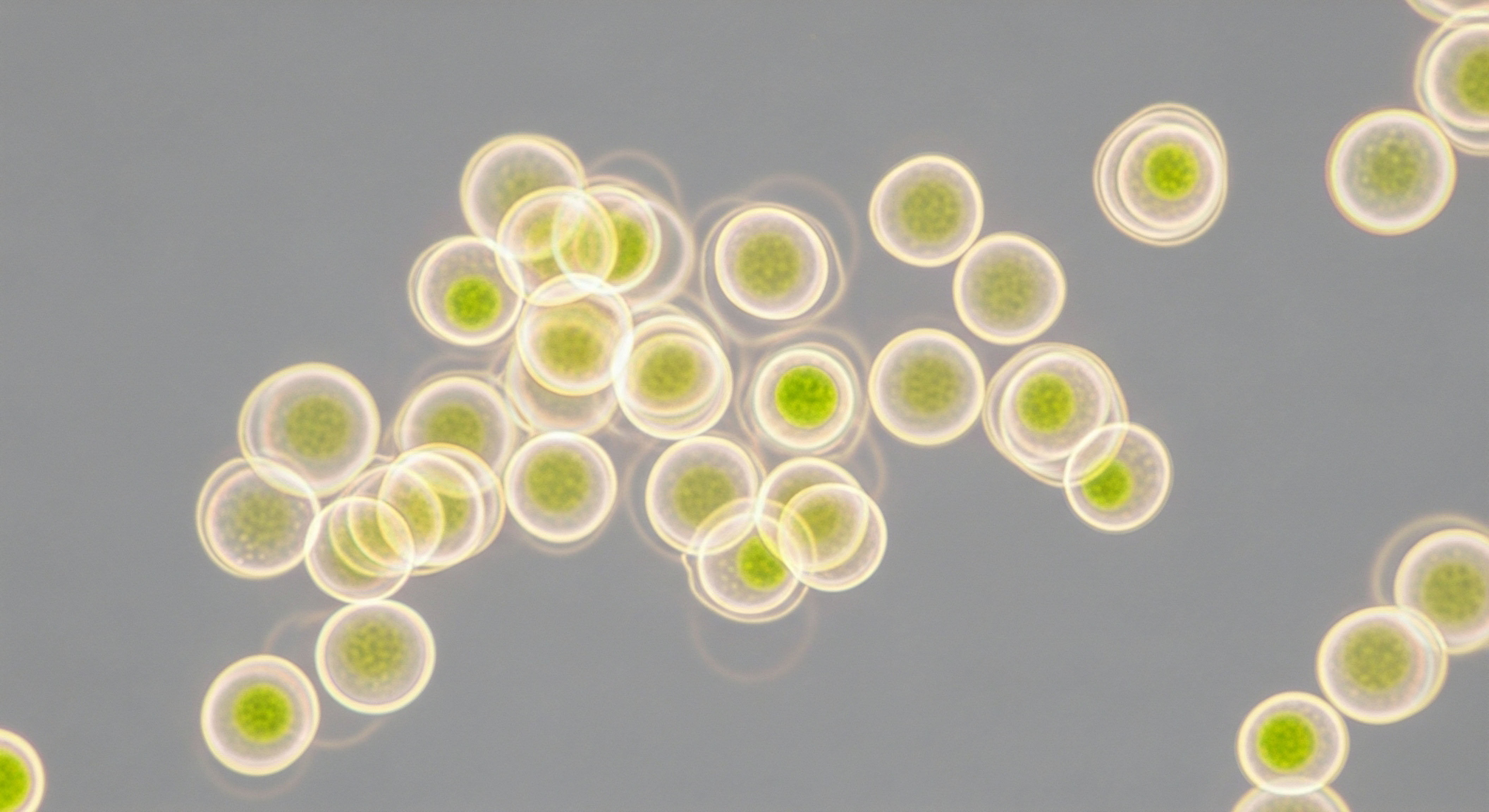

Fundamentals
The profound aspiration to safeguard the well-being of our progeny defines a fundamental aspect of human experience. Parents often contemplate the legacy they transmit, extending beyond immediate nurture to the very biological foundations inherited by their children. You might wonder if the choices you make today, as a father, could genuinely shape your child’s inherent metabolic resilience or susceptibility.
This deep, instinctual concern finds resonance in emerging scientific understanding, revealing a compelling interplay between paternal lifestyle and the foundational metabolic programming of offspring.
For many years, the primary focus in inherited health resided predominantly within the genetic code. Contemporary endocrinology and metabolic research, however, illuminate a more intricate picture, introducing the concept of epigenetics. This field describes modifications to gene expression that occur without altering the underlying DNA sequence.
These epigenetic “marks” act as crucial regulatory switches, dictating how and when genes are activated or silenced. Such mechanisms explain how environmental factors, including a father’s lifestyle, can influence the biological blueprint passed to the next generation.
Paternal lifestyle choices significantly influence the epigenetic programming of offspring, affecting their inherent metabolic vulnerabilities.
The germline, specifically sperm, serves as a remarkable conduit for these epigenetic signals. Scientific investigations have demonstrated that a father’s dietary patterns, physical activity levels, and overall metabolic health before conception can alter the epigenetic landscape within his sperm.
These alterations, encompassing changes in DNA methylation patterns and the composition of small non-coding RNAs (ncRNAs), can then be transmitted during fertilization. These inherited epigenetic patterns possess the capacity to influence gene expression in the developing embryo, subtly predisposing the offspring to certain metabolic trajectories.
Consider the endocrine system, a complex network of glands secreting hormones that act as the body’s internal messaging service. A father’s hormonal balance directly impacts his metabolic function, influencing everything from glucose regulation to fat distribution. When this delicate balance is compromised, perhaps by suboptimal lifestyle habits, it creates a systemic environment that can imprint metabolic vulnerabilities onto the germline. This intricate connection underscores the holistic nature of paternal health and its far-reaching implications.

How Does Paternal Health Influence Offspring Metabolism?
The mechanism by which paternal lifestyle interventions can mitigate inherited metabolic vulnerabilities centers on the plasticity of the epigenome. While genetic inheritance remains immutable, epigenetic modifications offer a dynamic layer of biological information that is responsive to environmental cues. When a father adopts a health-promoting lifestyle, it can lead to beneficial epigenetic adjustments within his sperm.
These positive changes, in turn, may confer a greater metabolic advantage to his children, potentially buffering them against predispositions to conditions such as insulin resistance or adiposity.
The scientific literature provides compelling evidence from preclinical studies, particularly in animal models, illustrating these phenomena. For instance, studies show that male mice subjected to obesogenic diets can transmit an increased susceptibility to metabolic diseases to their offspring. Conversely, paternal exercise interventions have been observed to improve glucose homeostasis and insulin sensitivity in progeny, correlating with modulated DNA methylation profiles in the paternal sperm.


Intermediate
Understanding the foundational principles of paternal epigenetic inheritance establishes a critical premise for exploring actionable lifestyle interventions. The question then becomes ∞ how can fathers strategically optimize their own endocrine and metabolic health to potentially recalibrate the inherited metabolic blueprint of their children? This involves a deeper consideration of specific protocols and their biological rationale, moving beyond general advice to clinically informed strategies.
A father’s metabolic milieu, significantly influenced by dietary choices, physical activity, and stress management, directly shapes the quality and epigenetic programming of his sperm. Dietary interventions represent a powerful lever in this context. A diet rich in micronutrients, antioxidants, and healthy fats, while limiting processed sugars and unhealthy lipids, can profoundly influence germline health. Such nutritional practices support optimal cellular function and reduce oxidative stress, both of which are critical for maintaining epigenetic integrity within sperm.
Targeted nutritional strategies and consistent physical activity are potent tools for optimizing paternal metabolic health and germline quality.
Physical activity is another cornerstone of paternal metabolic optimization. Regular, structured exercise regimens enhance insulin sensitivity, improve body composition by increasing lean muscle mass, and reduce visceral adiposity. These systemic metabolic improvements correlate with beneficial epigenetic changes in sperm. Research indicates that paternal exercise can modulate DNA methylation patterns in genes crucial for insulin signaling, thereby conferring improved glucose homeostasis to offspring.
Beyond diet and exercise, a comprehensive approach to paternal wellness incorporates stress reduction and adequate sleep. Chronic psychological stress elevates cortisol levels, which can disrupt the hypothalamic-pituitary-gonadal (HPG) axis and impair testosterone production. Suboptimal sleep patterns further exacerbate these endocrine imbalances, collectively contributing to a metabolic environment less conducive to healthy germline programming. Addressing these factors helps to stabilize hormonal rhythms and reduce systemic inflammation, creating a more favorable internal milieu.

Can Hormonal Optimization Protocols Play a Role?
For fathers experiencing symptomatic hormonal deficiencies, such as low testosterone (hypogonadism), targeted hormonal optimization protocols become a relevant consideration. Testosterone Replacement Therapy (TRT) for men, when clinically indicated, can significantly improve various metabolic parameters. These improvements include reductions in body mass index, waist circumference, and triglycerides, alongside increases in lean body mass and enhanced insulin sensitivity. By restoring optimal testosterone levels, TRT can recalibrate a father’s metabolic function, potentially influencing the quality of his germline through improved systemic health.
The direct impact of paternal TRT on offspring epigenetics requires further dedicated research. However, the indirect benefits derived from a father achieving a healthier metabolic state through such interventions are substantial. A body functioning with greater metabolic efficiency and hormonal equilibrium likely provides a more robust environment for spermatogenesis and epigenetic stability. This perspective highlights the interconnectedness of individual health optimization and its potential, albeit indirect, intergenerational ramifications.
Growth hormone peptide therapy offers another avenue for metabolic enhancement, particularly for active adults seeking improvements in body composition, fat loss, and tissue repair. Peptides such as Sermorelin, Ipamorelin, and CJC-1295 stimulate the natural release of growth hormone from the pituitary gland. This, in turn, promotes lipolysis, enhances protein synthesis, and supports overall metabolic function.
By fostering a state of improved cellular repair and metabolic efficiency, these therapies could contribute to a more optimized paternal physiology, which is conceptually favorable for germline health.
The following table outlines key lifestyle interventions and their direct metabolic impacts on fathers, which are hypothesized to influence offspring metabolic vulnerabilities ∞
| Lifestyle Intervention | Primary Metabolic Impact on Father | Potential Germline Epigenetic Influence |
|---|---|---|
| Balanced Nutrition | Improved glucose regulation, reduced inflammation, optimal body composition. | Stabilized DNA methylation, healthy ncRNA profiles in sperm. |
| Regular Exercise | Enhanced insulin sensitivity, increased lean muscle mass, reduced visceral fat. | Modulation of gene expression related to metabolic pathways. |
| Stress Management | Lowered cortisol, balanced HPG axis, improved hormonal milieu. | Reduced stress-induced epigenetic marks, improved sperm quality. |
| Adequate Sleep | Restored hormonal rhythms, improved metabolic efficiency. | Support for optimal spermatogenesis and epigenetic integrity. |
| Hormonal Optimization | Improved testosterone levels, better body composition, enhanced insulin sensitivity. | Indirect benefits through a healthier systemic metabolic environment. |


Academic
The profound capacity for paternal lifestyle to influence inherited metabolic vulnerabilities demands a rigorous exploration of underlying molecular mechanisms, extending into the realm of systems biology. This inquiry transcends mere correlation, seeking to elucidate the precise epigenetic conduits through which a father’s metabolic state can program the developmental trajectory of his offspring. Our focus here deepens into the intricate interplay of germline epigenetics, endocrine axes, and cellular metabolism, revealing a sophisticated narrative of intergenerational biological communication.
Epigenetic inheritance from the paternal lineage represents a compelling paradigm in developmental biology. This process involves the transmission of information beyond the DNA sequence itself, primarily through modifications such as DNA methylation, histone modifications, and the packaging of small non-coding RNAs (ncRNAs) within sperm.
These molecular tags regulate gene accessibility and expression in the early embryo, influencing cellular differentiation and metabolic programming. For instance, a father’s high-fat diet can alter sperm miRNA profiles, subsequently affecting the metabolic health and even behavioral traits of the progeny.
Paternal epigenetic inheritance, mediated by DNA methylation and non-coding RNAs in sperm, critically shapes offspring metabolic health.
The intricate orchestration of the hypothalamic-pituitary-gonadal (HPG) axis in the father holds a central position in this epigenetic dialogue. Optimal function of the HPG axis ensures robust spermatogenesis and a balanced endocrine environment, characterized by appropriate testosterone and gonadotropin levels.
Disruptions to this axis, often precipitated by metabolic dysregulation, oxidative stress, or chronic inflammation, can compromise sperm quality and alter its epigenetic cargo. Such alterations might include aberrant DNA methylation patterns in genes critical for glucose and lipid metabolism, predisposing the offspring to conditions like type 2 diabetes and obesity.
Specific ncRNAs, particularly microRNAs (miRNAs) and mitochondrial transfer RNAs (mt-tRNAs), emerge as potent mediators of paternal epigenetic inheritance. Studies reveal that paternal diet, especially high-fat consumption, can significantly upregulate mt-tRNAs and their fragments in mature spermatozoa.
These mt-tRNAs are subsequently transferred to the oocyte during fertilization, influencing gene transcription in early embryos and correlating with impaired glucose homeostasis in male offspring. This mechanism provides a direct molecular link between paternal dietary habits and the metabolic susceptibility of the next generation.

Molecular Modulators of Paternal Metabolic Inheritance
The cellular machinery responsible for energy metabolism within sperm also serves as a critical nexus for epigenetic imprinting. Mitochondria, the cellular powerhouses, play a dual role ∞ providing the ATP necessary for sperm motility and carrying mitochondrial RNAs that sense paternal metabolic quality.
A father’s compromised metabolic health, perhaps characterized by insulin resistance or dyslipidemia, can impair sperm mitochondrial function, leading to altered mt-tRNA profiles. These changes reflect a state of metabolic stress that can be transmitted, thereby affecting offspring metabolism.
Interventions aimed at optimizing paternal metabolic health, such as rigorous lifestyle modifications or clinically indicated hormonal support, act through multiple pathways to positively influence germline epigenetics. For instance, improvements in insulin sensitivity and reductions in systemic inflammation, often achieved through diet and exercise, directly mitigate the metabolic stressors that can induce adverse epigenetic modifications in sperm.
When a father undergoes Testosterone Replacement Therapy (TRT) to address hypogonadism, the resulting improvements in body composition, glucose control, and lipid profiles create a more favorable environment for spermatogenesis. While TRT’s direct epigenetic impact on sperm requires further elucidation, the systemic metabolic recalibration undoubtedly supports a healthier germline.
Growth hormone peptide therapies, like those utilizing Ipamorelin or CJC-1295, also contribute to this systemic optimization. By stimulating endogenous growth hormone release, these peptides enhance lipolysis, promote lean muscle mass, and improve overall metabolic efficiency. This biochemical recalibration reduces metabolic burden, potentially fostering a more stable and healthy epigenetic landscape within the germline. The convergence of these physiological improvements suggests a synergistic effect where a father’s sustained metabolic vitality translates into a more robust epigenetic endowment for his children.
The following list details key epigenetic mechanisms influenced by paternal lifestyle ∞
- DNA Methylation ∞ Addition of methyl groups to DNA, altering gene expression without changing the DNA sequence. Paternal diet and exercise can modify these patterns in sperm.
- Histone Modifications ∞ Changes to proteins around which DNA is wrapped, affecting chromatin structure and gene accessibility. Lifestyle factors influence these modifications.
- Small Non-coding RNAs (ncRNAs) ∞ Molecules like miRNAs and mt-tRNAs carried by sperm, which regulate gene expression in the early embryo. Paternal metabolic state directly impacts their profiles.
- Chromatin Remodeling ∞ Dynamic changes in chromatin structure, influenced by paternal environment, affecting how genes are read.
- Epididymosomes ∞ Vesicles transferring biomolecules, including RNAs, to sperm during maturation, mediating environmental influences.

Can Epigenetic Mechanisms Offer Therapeutic Targets?
The burgeoning understanding of paternal epigenetic inheritance opens avenues for future therapeutic interventions. Identifying specific epigenetic marks that confer metabolic vulnerability allows for the theoretical development of strategies to counteract these predispositions. This could involve nutritional interventions targeting specific epigenetic enzymes, or even pharmacological approaches designed to normalize aberrant epigenetic patterns in sperm.
Such advancements, while still nascent, underscore the profound implications of this research for proactive health management across generations. The journey towards understanding these complex biological systems represents a critical frontier in personalized wellness.
| Epigenetic Mechanism | Biological Role | Paternal Lifestyle Influence |
|---|---|---|
| DNA Methylation | Gene silencing, genomic stability | Dietary folate, exercise, stress |
| Histone Acetylation | Gene activation, chromatin opening | Nutrient availability, metabolic intermediates |
| Sperm miRNAs | Post-transcriptional gene regulation in embryo | High-fat diet, metabolic syndrome |
| Sperm mt-tRNAs | Mitochondrial function, early embryonic transcription | Paternal diet, mitochondrial quality |

References
- Tian, Z. Zhang, B. Xie, Z. Yuan, Y. Li, X. et al. “From fathers to offspring ∞ epigenetic impacts of diet and lifestyle on fetal development.” Epigenetics Insights, 2025.
- Tomar, A. Gomez-Velazquez, M. Gerlini, R. et al. “Epigenetic inheritance of diet-induced and sperm-borne mitochondrial RNAs.” Nature, 2024.
- Grandjean, V. et al. “Paternal multigenerational exposure to an obesogenic diet drives epigenetic predisposition to metabolic diseases in mice.” eLife, 2021.
- Chen, Q. et al. “Paternal Exercise Improves the Metabolic Health of Offspring via Epigenetic Modulation of the Germline.” International Journal of Molecular Sciences, 2021.
- Dupont, C. et al. “Consequences of Paternal Nutrition on Offspring Health and Disease.” Nutrients, 2021.
- Rastrelli, G. et al. “Testosterone replacement therapy improves metabolic parameters in obese men with testosterone deficiency ∞ a meta-analysis and systematic review.” Endocrine Abstracts, 2024.
- Kizilarslan, A. et al. “The Long-Term Benefits of TRT on Metabolic Health.” Journal of Clinical Endocrinology & Metabolism, 2025.
- Marcus Clinic. “The Hidden Metabolic Benefits of TRT Most Men Don’t Hear About.” Journal of Metabolic Health, 2025.
- Performance Rejuvenation Center. “4 Benefits of Growth Hormone Peptides.” Nature Reviews Endocrinology, 2025.
- NM Stem Cell. “Peptides and Fat Loss ∞ Understanding the Mechanisms for Effective Weight Management.” Journal of Peptide Research, 2024.

Reflection
The insights presented here invite a profound introspection into your own biological narrative and its potential echoes across generations. Understanding the intricate connections between your lifestyle, hormonal health, and the epigenetic legacy you transmit represents a significant step towards a more empowered existence. This knowledge is not an endpoint; it signifies a commencement.
It is the initial illumination on a path towards recalibrating your systems, reclaiming vitality, and fostering a robust biological foundation for those who follow. Your personal journey towards optimal wellness, therefore, becomes a testament to proactive health, influencing not only your present but also shaping a healthier future.



